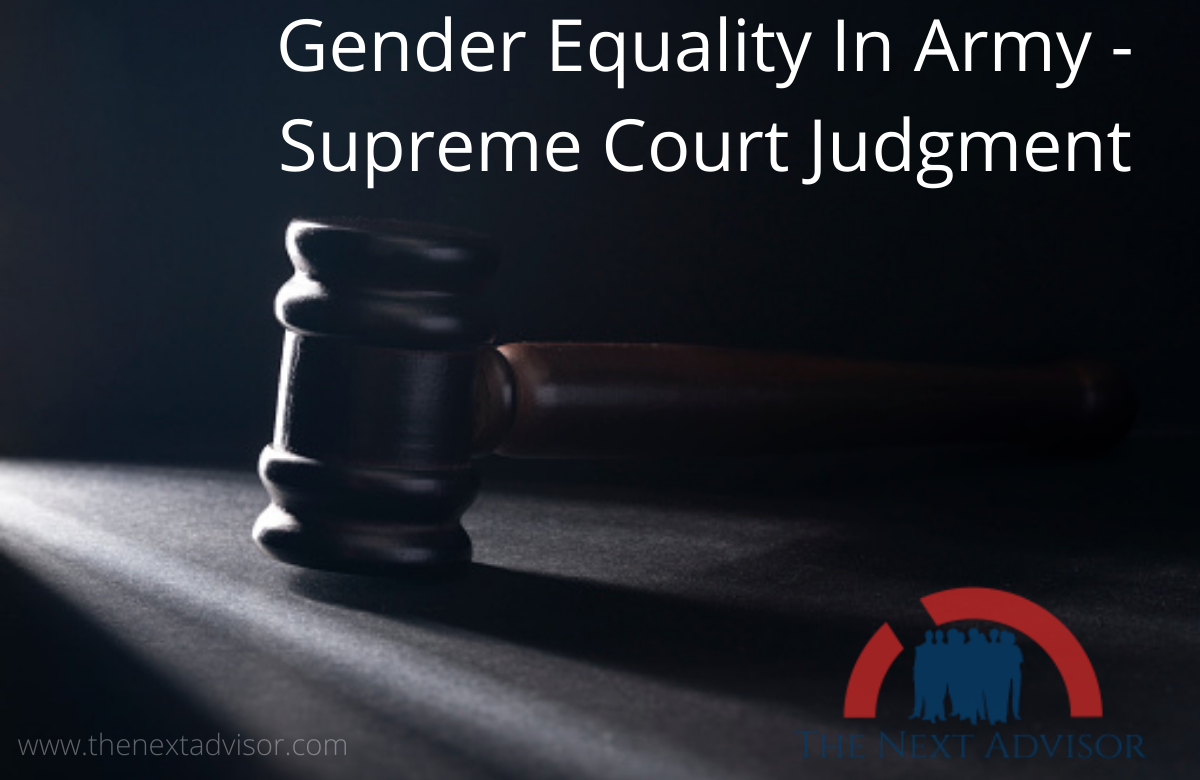Supreme Court and High Court delivered the judgment about Gender Equality in Army & the name of the case is Secretary, Ministry Of Defence Vs Babita Puniya. Let us see Gender Equality in Army in the detail with the case analysis.
Background of Gender Equality In Army – Supreme Court Judgment
• In February 2003, Babita Puniya, an advocate instituted a Writ Petition in the nature of a Public Interest Litigation before the Delhi High Court for the grant of PC to women SSC officers in the Army.
• Apart from the PIL which was instituted before the High Court of Delhi, a Writ Petition was filed by Major Leena Gurav on 16 October 2006 primarily to challenge the terms and conditions of service imposed by the circulars dated 20 July 2006 and for seeking the grant of PCs for women officers.
• The strategy amendment in 2006 permitted women officers to serve for a limit of 14 years as SSC officials. The Center chose in September 2008 to allow the permanent commission to SSC ladies officials in the Judge Advocate General office and Army Education Corps and their comparing branches in the Air Force and Navy. ,
• Adjudicating writ petitions challenging this, the High Court of Delhi held in 2010 that women who had entered the army on Short Service Commissions [ ” SSCs ” ], we’re entitled to PCs on par with their male colleagues.
•The Union of India appealed this decision to the Supreme Court. During the pendency of the hearing, it also proposed a separate policy for grant of PCs to women, which nonetheless was limited to staff positions, imposed different standards, as well as only applied prospectively.
• In May 2018, the Center disclosed to Apex Court that it is thinking about giving permanent commission to women officials enrolled through SSC in the Army. In August, PM Modi reported a significant move by announcing that women officials will have the option to decide on changeless commission in parts of the military separated from existing ones like law and instruction.
• In February 2019, the legislature brought a notification reporting the permanent commission of women officials yet tentatively made it appropriate just to those women officials dispatched after this request.
• The serving officials were kept out of the ambit of this notification.
• In the same month, the Center issued a request for an award of perpetual commission to new SSC officials in eight battle bolster arms/administrations.

Gender Equality In Army- Secretary, Ministry Of Defence Vs Babita Puniya
Petitioner’s Arguments In Gender Equality In Army Case
• Grant of Permanent commissions-Under Section 10 of the 1950 Act, the award of commission is at the carefulness of the President of India. The nonattendance of an essential option to guarantee PC is strengthened by Section 12 of the 1950 Act by reason of which, no lady is qualified for work with the exception of in such corps and divisions as the Government of India may decide.
• The ability to give commission has a place with the President and no mandamus can be asserted from a court. Moreover, the order stipulated on Feb.25, 2019, has been in the national interest.
• It provides for training of SSC women in specialized fields of language interpreting, imaginary interpreting, etc. The reason for not providing women who are already in service is that after 14 years they have limited years of service left. Training them would result in a waste of resources.
• Pensionary Benefits – It was argued that in a policy decision dated 15 February 2019, the women would be allowed to work if they have completed 14 years of service but not 20 years to attain pension without scrutiny. Those who have completed 20 years of service would be relieved immediately with a pension k
• Policy considerations- the question related to recruitment and grant of PC’s have been constituted as policy decisions and the executive have exclusive domain over them. These provisions related to fundamental rights have been protected by Art.33 of the constitution. The scope of Judicial review in command and tenure have been limited as held by Union of India V PK Choudhary.
• Occupational hazards- According to the Union of India, women are not employed on duties that are hazardous in nature unlike their male counterparts in the same Arm / Service who are liable to be employed in combat duties.
• Discrimination – there has been no discrimination since there are extra benefits available to women officers like maternity leave which their male counterparts are deprived of.
• Employment in staff appointments- The women officers are reinstated after the orders of the Delhi High Court. Expanding the scope of the high court judgment would open a floodgate resulting in administrative issues.
• SSC as a support cadre- The Ajay Vikram Singh Committee constituted by the Union Government to inquire into cadre issues in the Armed Forces favored a lean permanent cadre of officers, supplemented by an enhanced support cadre in the ratio 1: 1.1. Hence, further induction into the PC cadre through the SSC cadre will upset the organizational structure of the Army.
• Employment in staff appointments- Since 1992, the Union Government has restricted the eligibility of women officers to select appointments, as decided from time to time by Army headquarters. These orders have not been subjected to challenge or have been invalidated.
• The accommodation note of the Union of India has discussed “physiological restrictions” on the employability of ladies officials. “emphasized by the difficulties of imprisonment, parenthood, and childcare”. At long last, the note forecasts the threats of a lady official being caught by the foe and turning into a wartime captive.
Respondent’s Arguments In Gender Equality In Army – Supreme Court Judgment
• The respondents argued that there was no stay on the implementation of the judgment of the Delhi High Court, still, no steps were taken to grant PCs to women officers in the Army in compliance with the judgment of the Delhi High Court.
• Battlefield Scenario: The Army considers women officers as an effective workforce until they complete fourteen years of service. The nature of duties is similar to male officers. Having served shoulder to shoulder with male officers for twenty-five years, the contention advanced by the Union of India with 000 respect to battlefield scenarios lacks substance;
• Unit cohesion: The Union of India has alleged that the presence of women has a negative impact on unit cohesion. It is time that the organization starts accepting women as equal colleagues; and
• National security: Despite the present batch of appeals being sub – judice for ten years, women officers of all ages and service profiles are still being posted to sensitive places, field areas, force headquarters, and units without being commissioned into combat arms. ;
• Women officers have been left in the lurch without pensionary and promotional benefits at par with their male counterparts despite having dedicated prime years of their lives to the service of the nation
• The claim of the appellant that there is a probability of women officers being exposed to a hostile environment where there is a grave danger of their coming in contact with the enemy is discriminatory and without any basis. Thirty percent of all women officers are posted in the field (combat zones).
• Despite the deficiency of officers in support services, the Indian Army is letting go of trained women officers due to gender discrimination and not granting PCs to women officers. The vacancies in the Indian Army can be easily handled by women officers;
Judgment of Gender Equality In Army – Supreme Court Judgment
• Chandrachud J. began his analysis by noting that while Article 33 did allow for restrictions upon fundamental rights in the Armed Forces, it also made it clear that these rights could be restricted only to the extent that it was necessary to ensure the proper discharge. of duties and the maintenance of discipline.
• On the other hand, from 1991, there had been an “evolutionary process” towards inducting women into the extent of the armed force that in the 2019 Policy Document submitted before the Court, even PCs (in certain fields) had been opened up to women. In fact, this created an internal contradiction within the submissions of the union of India, as:
• Going further, however, Chandrachud J. noted that:
• “The submissions advanced in the note tendered to this Court are based on xxx stereotypes premised on assumptions about socially ascribed roles of gender which discriminate against women. Underlying the statement that it is a “greater challenge” for women officers to meet the hazards of service “owing to their prolonged absence during pregnancy, motherhood and domestic obligations towards their children and families” is a strong stereotype that assumes that domestic obligations rest solely on women.
• Reliance on the “inherent physiological differences between men and women” rests in a deeply entrenched stereotypical and constitutionally flawed notion that women are the “weaker” xxx and may not undertake tasks that are too arduous “for them. Arguments founded on the physical strengths and weaknesses of men and women and on assumptions about women in the social context of marriage and family do not constitute a constitutionally valid basis for denying equal opportunity to women officers.
• To deny the grant of PCs to women officers on the ground that this would upset the “peculiar dynamics” in a unit casts an undue burden on women officers which has been claimed as a ground for excluding women.
• The written note also relies on the “minimal facilities for habitat and hygiene” as a ground for suggesting that women officers in the services must not be deployed in conflict zones. The respondents have placed on record that 30% of the total women officers are in fact deputed to conflict areas.
• On a similar basis, the Court also rejected the blanket prohibition upon the grant of PCs to women in command appointments (and restricted only to staff appointments), noting that the Army bore the burden of justifying such exclusion and that in any event, it could only be done on a case to case basis.
• In sum, therefore, it accepted the 2019 Policy, but (a) made it applicable across the board, and (b) removed its limited scope to staff appointments.
Justice Chandrachud gave a list of directions in the last part of his judgment of Gender Equality In Army which is as follows:
The policy decision which has been taken by the Union Government allowing for the grant of PCs to SSC women officers in all the ten streams where women have been granted SSC in the Indian Army is accepted subject to the following:
1. All serving women officers on SSC shall be considered for the grant of PCs irrespective of any of them having crossed fourteen years or, as the case may be, twenty years of service.
2. The option shall be granted to all women presently in service as SSC officers.
3. The expression “in various staff appointments only” in para 5 and “on staff appointments only” in para 6 shall not be enforced; with respect to PC of women.
4. At the stage of opting for the grant of PC, all the choices for specialization shall be available to women officers on the same terms as for the male SSC officers. Women SSC officers shall be entitled to exercise their options for being considered for the grant of PCs on the same terms as their male counterparts.
5. The order of the Della High Court is affirmed in this case.
6. SSC women officers who are granted PC in pursuance of the above directions will be entitled to all consequential benefits including promotion and financial benefits.



























